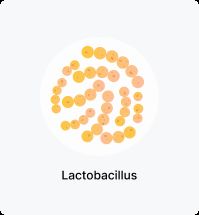Probiotics have become increasingly popular in recent years, and for good reason. More and more scientific studies point to the positive effects of these ‘good’ bacteria on our health. They are often praised for their role in improving digestion, boosting the immune system, and promoting healthy gut flora. In this article, we will dive deeper into what probiotics are, how they work, and when it is best to take them.

What are probiotics?
Definition of probiotics:
Probiotics are live microorganisms, such as bacteria and yeasts, that have beneficial effects on health, especially in the gut. They help maintain the balance of good bacteria in the body and are often associated with improved digestion and a stronger immune system.
What do probiotics do?
Probiotics support digestion by breaking down nutrients and promoting healthy gut flora. They also help reduce inflammation, improve immune function, and protect against harmful bacteria.
Where can probiotics be found?
Probiotics are found in fermented foods such as yogurt, kefir, sauerkraut, and kimchi, but are also available as supplements.
Difference between probiotics and prebiotics:
Prebiotics are dietary fibers that stimulate the growth of probiotic bacteria. While probiotics are live bacteria, prebiotics serve as “food” for these beneficial bacteria.


What are probiotics good for?
Probiotics offer multiple health benefits:
- Digestion: They help break down food and improve nutrient absorption.
- Immune function: Probiotics strengthen the immune system by fighting harmful pathogens.
- Anti-inflammatory: They help reduce inflammation in the intestines.
- Gut health: A healthy gut contributes to more energy, a better mood, and a stronger immune system. By using probiotics, you support a balanced gut flora that is crucial for overall well-being.



What types of probiotics exist?
There are various strains of probiotics, each with its own unique functions:
- Lactobacillus: Supports digestion and helps break down lactose.
- Bifidobacterium: Strengthens immune function and improves the gut barrier.
- Saccharomyces: A probiotic yeast that helps combat diarrhea caused by antibiotics.



When to take probiotics?
Choosing the right time to take probiotics can make a significant difference in their effectiveness. Probiotics can be beneficial at different times, depending on your health condition and specific needs. Below, we discuss some common situations where taking probiotics can be advantageous:
After an antibiotic course
Antibiotics can kill harmful bacteria, but unfortunately, they can also eliminate a large portion of the good bacteria in your gut. This can lead to an imbalanced gut flora and issues like diarrhea. Taking probiotics during and after an antibiotic course can help restore the balance of bacteria in your gut and prevent unpleasant side effects such as antibiotic-associated diarrhea.
For digestive issues such as bloating
Bloating is often caused by an imbalance in your gut flora, leading to gas buildup in your intestines. Probiotics, especially strains like Lactobacillus and Bifidobacterium, can help restore this balance, reduce gas production, and relieve bloating. By taking probiotics regularly, you can promote a healthier gut environment, helping to prevent these discomforts.
For constipation
Constipation is often caused by a sluggish bowel or an imbalance in gut flora. Certain probiotic strains, such as Bifidobacterium, can stimulate bowel movements and improve digestion. Taking probiotics can help promote regular bowel movements and prevent prolonged constipation.



For traveler’s diarrhea
Traveler’s diarrhea is a common issue when visiting new countries with different bacteria in the water and food. Probiotics can help prepare your gut for these changes and protect against harmful bacteria that cause diarrhea. It is recommended to start taking probiotics before your trip and continue during your stay to reduce the risk of diarrhea.
For chronic inflammatory diseases
For people with chronic inflammatory diseases such as irritable bowel syndrome (IBS) or inflammatory bowel disease (IBD), probiotics can help reduce inflammation in the intestines. Research shows that certain strains, such as Lactobacillus and Bifidobacterium, have anti-inflammatory properties, which can alleviate symptoms and contribute to an improved quality of life.
Daily immune support
The immune system is closely linked to the health of your gut. A large portion of your immune cells are located in the digestive tract, and a healthy gut flora plays a crucial role in preventing infections. By taking probiotics daily, you support the growth of good bacteria that help keep harmful pathogens at bay, especially during stressful periods or seasonal changes when you are more susceptible to illness.


How to Best Take Probiotics?
- On an empty stomach or with food?
It is often better to take probiotics during or right after a meal, as this increases the survival of the good bacteria. Food, especially fat-rich meals, can reduce the acidity of the stomach, allowing more bacteria to reach the intestines and do their job there.
- Consistency is key
Probiotics work best when taken regularly. The effects are cumulative, meaning that consistent use over time can significantly improve your gut health. Although you may notice benefits after a few days, it can take 1-2 weeks for the maximum effects to become visible.

Possible risks of taking probiotics & why microbiome tests are necessary
Although probiotics are often praised for their health benefits, they cannot be taken by everyone without risk. It’s important to understand that probiotics may work differently depending on the unique composition of your microbiome. Below, we discuss the possible risks and why a microbiome test may be essential to achieve maximum benefits:
Minimal or no results without knowledge of your microbiome
Probiotics are not universal. What works well for one person may have little to no effect on another. This is because the effectiveness of probiotics depends heavily on the current composition of bacteria in your gut. Without insight into your microbiome, you risk taking probiotics that do not align with your specific needs, resulting in minimal or even for noticeable results.
Worsening of symptoms like bloating or gas
In some cases, randomly adding probiotics can even worsen your symptoms. Certain strains can cause gas or bloating if they are not balanced with the rest of your gut flora. This is especially a risk if your microbiome is already out of balance due to an overabundance of a particular bacterial strain. Adding more of the same strain can exacerbate this imbalance, leading to unwanted side effects.


Risk of bacterial overgrowth
If you already have an excess of certain bacteria in your gut, taking probiotics that further promote these bacteria can lead to bacterial overgrowth. This can cause issues such as Small Intestinal Bacterial Overgrowth (SIBO), a condition where too many bacteria accumulate in the small intestine. Symptoms of SIBO include abdominal pain, diarrhea, and bloating. Testing your microbiome can help prevent you from inadvertently adding bacteria that are already present in excess.
Unexpected reactions to specific strains
Not all probiotics are the same. Some strains are better suited for improving digestion, while others are more focused on supporting the immune system. Without knowing which bacterial strains you currently have in your gut, you may end up taking probiotics that don’t align with your needs. This can not only result in ineffectiveness but also lead to unexpected reactions such as allergies or food sensitivities.

Example: Why a test is important when using antibiotics
Suppose you’ve just finished a course of antibiotics. Antibiotics not only destroy harmful bacteria but also many of the good bacteria in your gut. Taking probiotics without knowing which bacteria you’ve lost may mean you’re replenishing the wrong bacterial strains. This can lead to an imbalance, as some probiotics may add too much of one type of bacteria. By doing a microbiome test, you can gain insight into which bacterial strains you actually need to restore a healthy gut flora.
Taking random probiotics can be a ‘trial-and-error’ process, costing both time and money. A microbiome test helps refine this process by providing an accurate assessment of the bacteria in your gut. At Easly, you can easily perform a test that maps out your microbiome. Based on the results, you will receive personalized recommendations for probiotics and foods that specifically match your unique gut flora. This allows you to make targeted choices that better align with your health and help prevent potential side effects from supplements.


Why microbiome tests are essential
A microbiome test provides you with the knowledge needed to make effective decisions about your health. Instead of guessing which probiotics to take, the test from Easly gives you a detailed insight into the state of your gut flora. This way, you know exactly which bacteria dominate in your gut and which bacteria you can supplement. This prevents you from accidentally taking the wrong probiotics and ensures you achieve the best results for your unique microbiome.
By testing your microbiome first, you reduce the risk of side effects and increase the effectiveness of probiotics. Based on your test results, you will receive personalized recommendations that help you choose the right probiotics and foods, allowing you to benefit from a healthier gut flora.
Conclusion
Probiotics can play an important role in improving your digestion, immune function, and overall health. However, it’s essential to know which probiotics are suitable for your unique microbiome. By first taking a microbiome test, such as the one from Easly, you gain insight into the bacterial composition of your gut and can take targeted steps to optimize your gut health.







